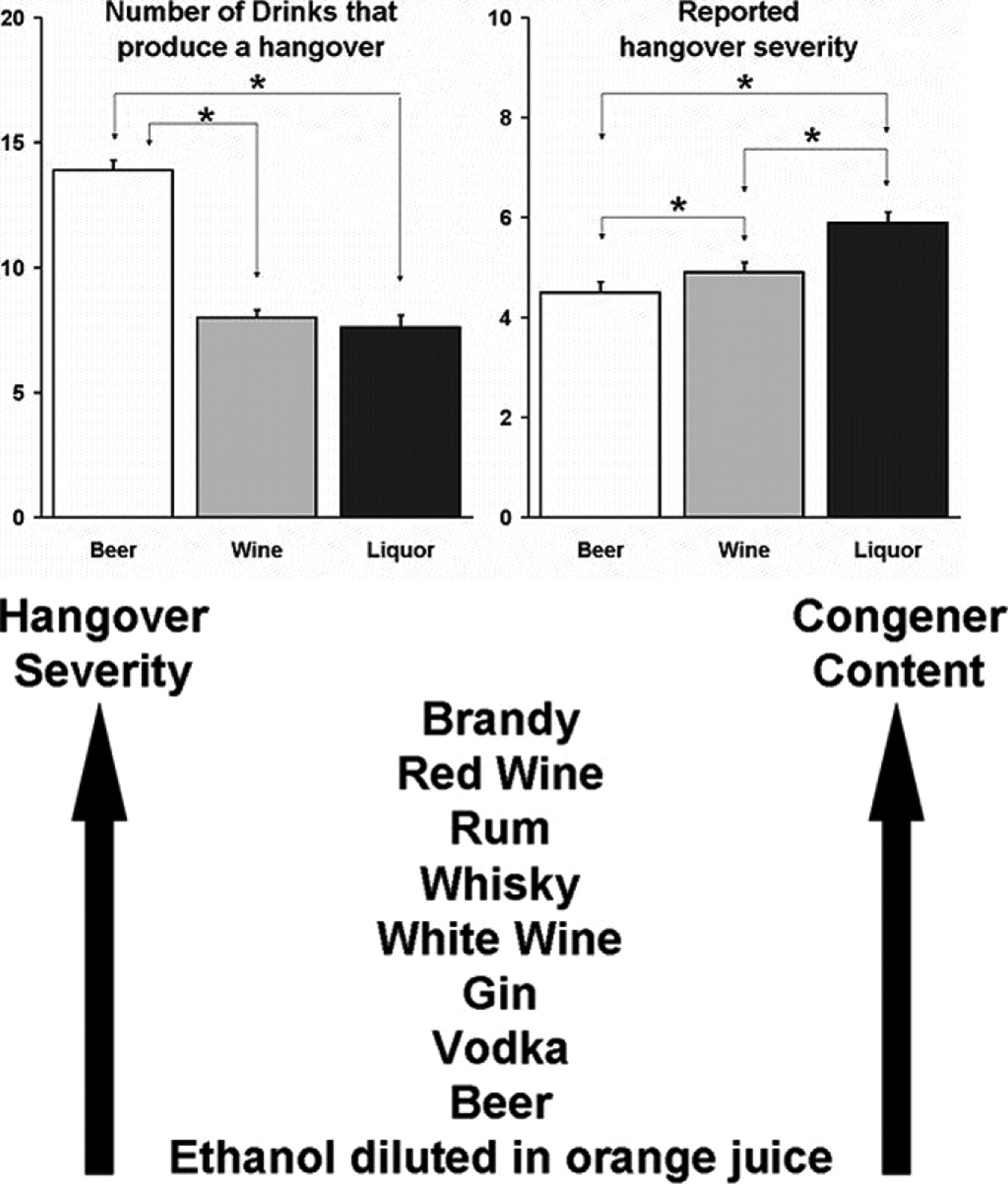Christmas food for thought: which booze causes the worst hangover?
What’s Christmas without a bottle of good wine, a snifter (or two) of peaty Ardburg and a few raunchy family tales that, upon awakening the next morning with a pulsing head and stone-cold sober realization, counts as Too Much Information should never had graced your ears?
If you’re like me, however, you’re probably in too much misery to care about what your 65-year-old-aunt-did-in-that-summer-30-years-ago. Despite its long history and frequent occurrence, hangovers remain enigmatic monsters that haunt those reckless enough to seek the dew of the gods with no reservation. The symptoms appear AFTER the alcohol is eliminated from the body, and (against popular belief) may not be a direct result of dehydration.
Physiological causes aside, perhaps it’s more useful to figure out what type of booze precipitates the worst hangovers all else equal. One common rumour is that dark-coloured alcohols – think bourbons, dark rum and scotch – give more of a punch than their paler counterparts.
Alcohol by itself is colorless. The colour of unadulterated alcoholic beverages comes from congeners – chemicals other than ethanol that seep into the final product due to the fermentation and aging process. They are complex organic molecules with toxic effects, including acetaldehyde (metabolite of ethanol that gives the “Asian glow”), tannins (astringent-tasting molecules found in red wines) and even methanol. That’s not the say they’re BAD – bourbon contains 37 times more of these flavorful molecules than vodka, which gives them their distinctive taste. Nevertheless, congeners are thought to make hangovers worse. A study in 2009 put this theory to the test, pitting Wild Turkey bourbon against Absolute vodka.
Researchers recruited 95 college-aged, non-alcoholic participants and invited them for two wine-and-dine sessions in the lab. One of the nights they got either bourbon or vodka mixed with coke to mask the taste, the other night they got coke-mixed tonic water as a non-alcoholic control bevarage. After ensuring the participants were indeed intoxicated, researchers put them to bed. Since alcohol negatively affects the quality and duration of sleep, researchers monitored the participants’ sleep architecture. The next morning, the team measured the intensity of the participant’s hangovers with a symptom-based scale and tested the subject’s cognitive function with 2 tasks that required sustained attention and reaction time.
Full protocol for each session. Polysomnograph monitors sleep.
Sure enough, bourbon caused a worse self-reported hangover than vodka in both men and women. Alcohol consumption also made it more difficult to fall asleep for women and decreased sleep efficacy in both sexes, which led to poorer performance on the cognitive tasks. However, although bourbon made the subjects FEEL crappier, its effects on sleep and next-day brain function were no worse than that of vodka.
These results seem to suggest that alcohol is alcohol, regardless of what type you drink. Bourbons may make you suffer more the next morning, but as coke can hardly mask the spicy bite of Wild Turkey, placebo effects could have skewed the participant’s subjective hangover ratings. But the data is hard to extrapolate. Most of the participants were caucasian (79%); since many asians lack the aldehyde dehydrogenase enzyme that helps break down acetylaldehyde - a toxic metabolite of ethanol and a common congener - it's likely that asians may find bourbon more intolerable than vodka. Furthermore, the amount of alcohol consumed in this study was just enough to reliably induce a hangover – it’s hard to say how well results hold if you drink more. After all, even for congeners the dose makes the poison.
In line with this, a survey in 2006 among Dutch college students after drinking beer, wine or liquors showed that it takes fewer high-congener drinks to get a hangover and a worse one at that (see graph below). Unfortunately as surveys are hardly strictly controlled and rely on self-reporting, so take these “naturalistic” results as you will. Personally, I think I’ll keep embracing the dark side.
"Ethanol diluted in OJ" is a very unsatisfying alternative to a good Screwdriver. Source doi:10.1093/alcalc/agm163.
Finally, one special case in hangovers is the notorious red wine headache. Although red wine is lower in alcohol content than spirits, it’s especially high in histamines, tannins, flavonoids and sugar (especially the cheaper reds), all of which along with alcohol makes a perfect hangover stew. Add to the fact that wine glasses are much larger in size than shot or tall glasses, and that people tend to pour more into wider glasses and when they’re holding the glass, it’s perhaps not so surprising that a classy family night with wine can still feel like a night out clubbing the morning after.
Ultimately, you’re probably going to keep drinking your drink-of-choice no matter what science says. But maybe stick to lighter quality booze at family gatherings just in case. It just might make your boxing day shopping a little easier.
Rohsenow DJ, Howland J, Arnedt JT, Almeida AB, Greece J, Minsky S, Kempler CS, & Sales S (2010). Intoxication with bourbon versus vodka: effects on hangover, sleep, and next-day neurocognitive performance in young adults. Alcoholism, clinical and experimental research, 34 (3), 509-18 PMID: 20028364












